Unit 3 Could you please clean your room?单元测试题(含答案)人教版八年级下册
文档属性
| 名称 | Unit 3 Could you please clean your room?单元测试题(含答案)人教版八年级下册 |
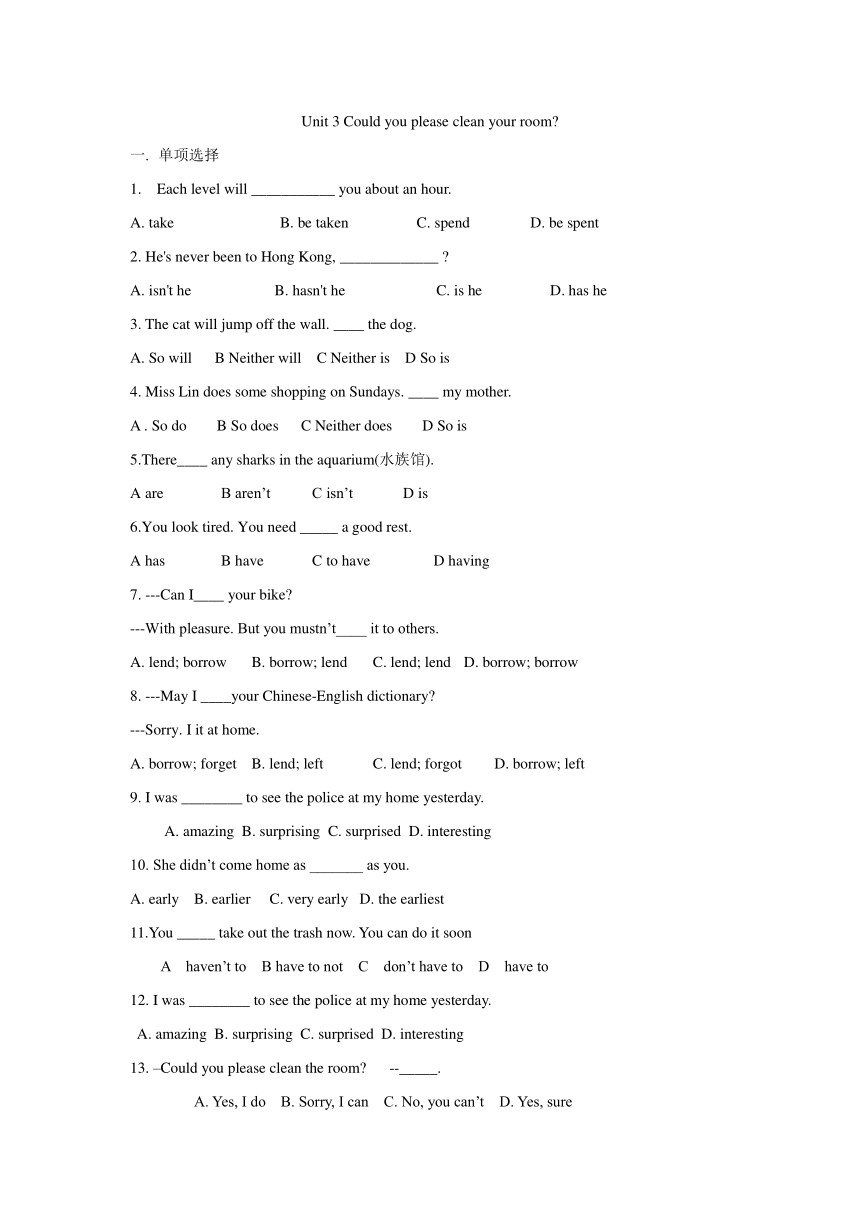
|
|
| 格式 | docx | ||
| 文件大小 | 32.3KB | ||
| 资源类型 | 教案 | ||
| 版本资源 | 人教新目标(Go for it)版 | ||
| 科目 | 英语 | ||
| 更新时间 | 2025-02-23 00:00:00 | ||
图片预览

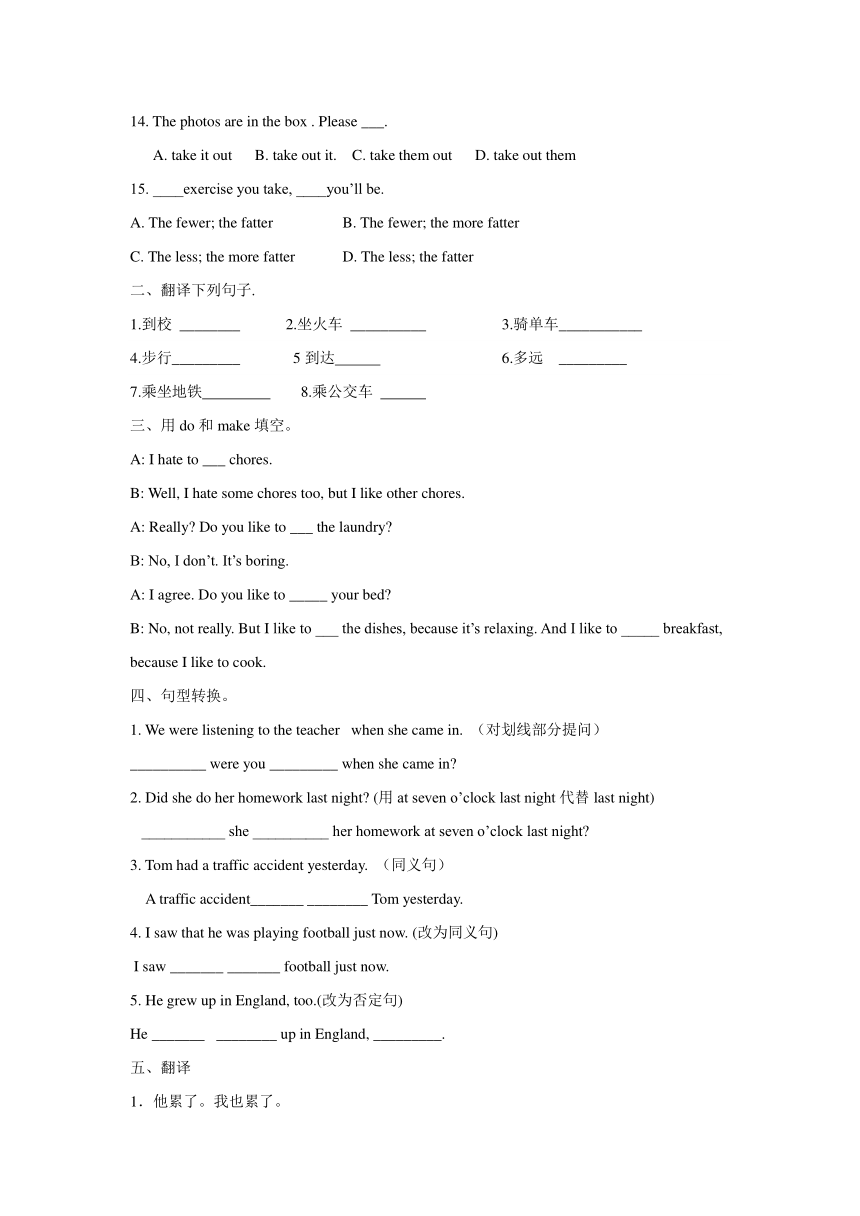
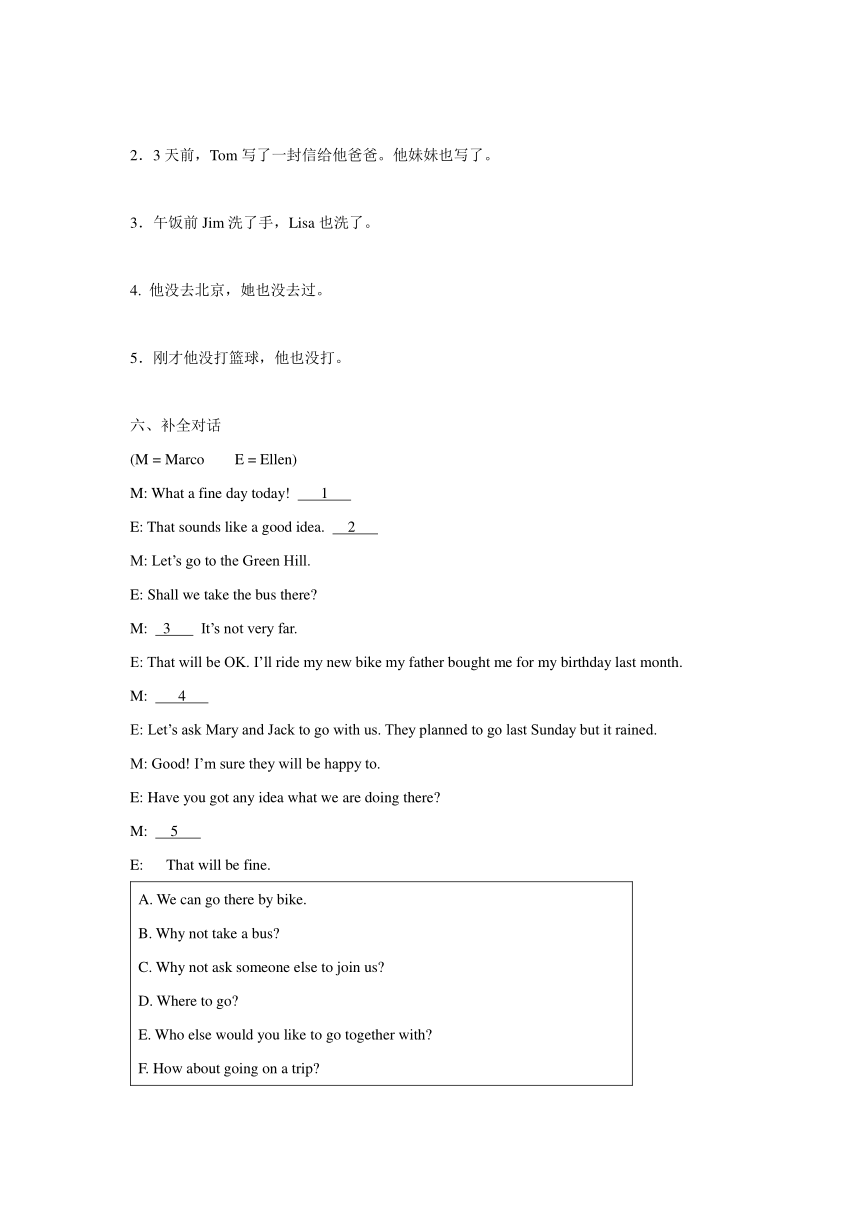
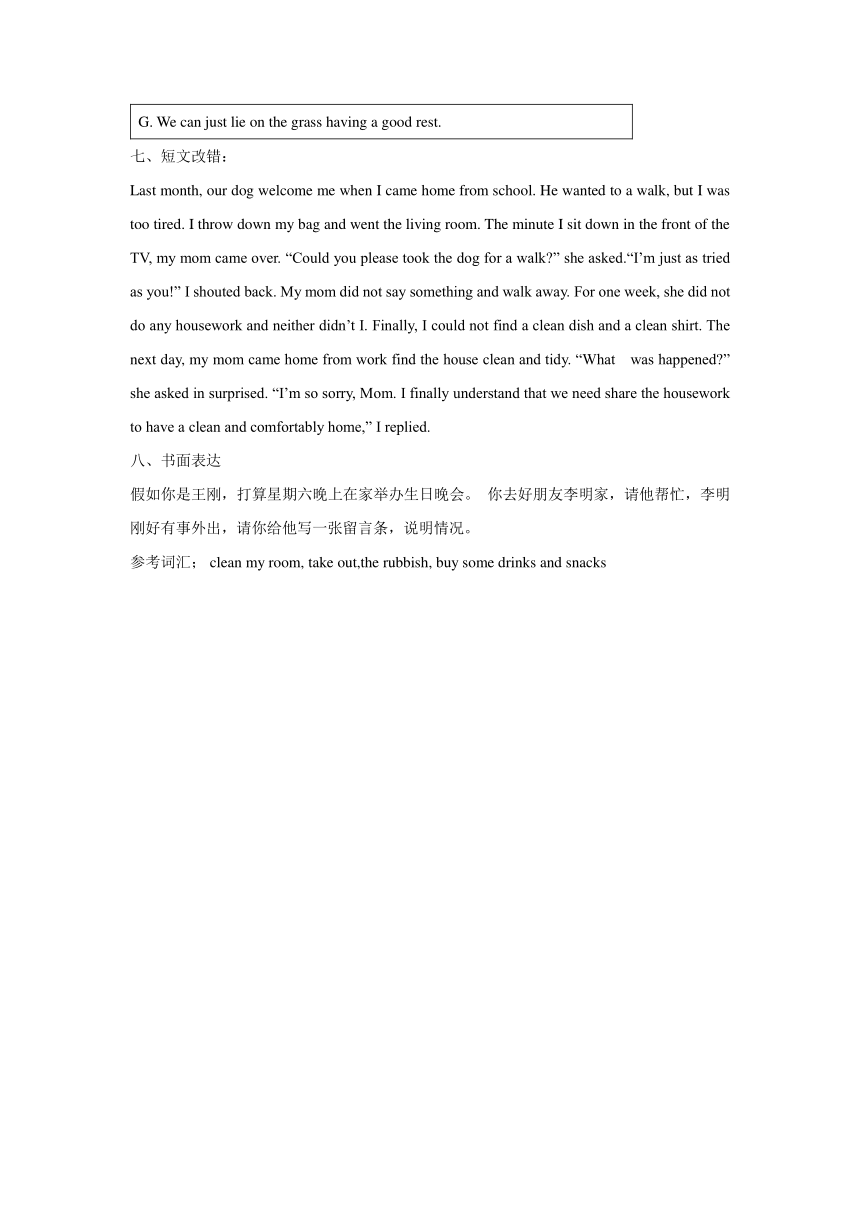
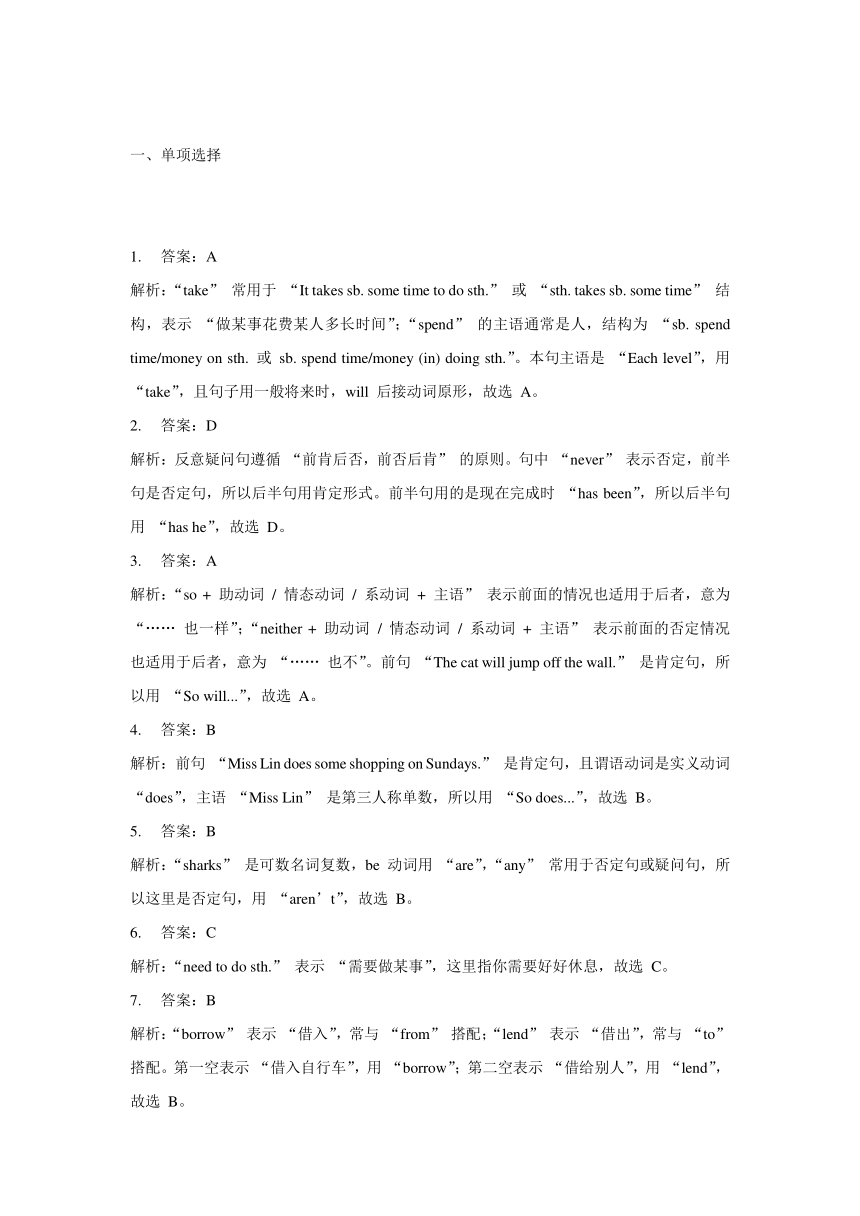
文档简介
Unit 3 Could you please clean your room
单项选择
1. Each level will ___________ you about an hour.
A. take B. be taken C. spend D. be spent
2. He's never been to Hong Kong, _____________
A. isn't he B. hasn't he C. is he D. has he
3. The cat will jump off the wall. ____ the dog.
A. So will B Neither will C Neither is D So is
4. Miss Lin does some shopping on Sundays. ____ my mother.
A . So do B So does C Neither does D So is
5.There____ any sharks in the aquarium(水族馆).
A are B aren’t C isn’t D is
6.You look tired. You need _____ a good rest.
A has B have C to have D having
7. ---Can I____ your bike
---With pleasure. But you mustn’t____ it to others.
A. lend; borrow B. borrow; lend C. lend; lend D. borrow; borrow
8. ---May I ____your Chinese-English dictionary
---Sorry. I it at home.
A. borrow; forget B. lend; left C. lend; forgot D. borrow; left
9. I was ________ to see the police at my home yesterday.
A. amazing B. surprising C. surprised D. interesting
10. She didn’t come home as _______ as you.
A. early B. earlier C. very early D. the earliest
11.You _____ take out the trash now. You can do it soon
A haven’t to B have to not C don’t have to D have to
12. I was ________ to see the police at my home yesterday.
A. amazing B. surprising C. surprised D. interesting
13. –Could you please clean the room --_____.
A. Yes, I do B. Sorry, I can C. No, you can’t D. Yes, sure
14. The photos are in the box . Please ___.
A. take it out B. take out it. C. take them out D. take out them
15. ____exercise you take, ____you’ll be.
A. The fewer; the fatter B. The fewer; the more fatter
C. The less; the more fatter D. The less; the fatter
二、翻译下列句子.
1.到校 ________ 2.坐火车 __________ 3.骑单车___________
4.步行_________ 5到达 6.多远 _________
7.乘坐地铁 8.乘公交车
三、用do和make填空。
A: I hate to ___ chores.
B: Well, I hate some chores too, but I like other chores.
A: Really Do you like to ___ the laundry
B: No, I don’t. It’s boring.
A: I agree. Do you like to _____ your bed
B: No, not really. But I like to ___ the dishes, because it’s relaxing. And I like to _____ breakfast, because I like to cook.
四、句型转换。
1. We were listening to the teacher when she came in. (对划线部分提问)
__________ were you _________ when she came in
2. Did she do her homework last night (用at seven o’clock last night代替last night)
___________ she __________ her homework at seven o’clock last night
3. Tom had a traffic accident yesterday. (同义句)
A traffic accident_______ ________ Tom yesterday.
4. I saw that he was playing football just now. (改为同义句)
I saw _______ _______ football just now.
5. He grew up in England, too.(改为否定句)
He _______ ________ up in England, _________.
五、翻译
1.他累了。我也累了。
2.3天前,Tom写了一封信给他爸爸。他妹妹也写了。
3.午饭前Jim洗了手,Lisa也洗了。
4. 他没去北京,她也没去过。
5.刚才他没打篮球,他也没打。
六、补全对话
(M = Marco E = Ellen)
M: What a fine day today! 1
E: That sounds like a good idea. 2
M: Let’s go to the Green Hill.
E: Shall we take the bus there
M: 3 It’s not very far.
E: That will be OK. I’ll ride my new bike my father bought me for my birthday last month.
M: 4
E: Let’s ask Mary and Jack to go with us. They planned to go last Sunday but it rained.
M: Good! I’m sure they will be happy to.
E: Have you got any idea what we are doing there
M: 5
E: That will be fine.
A. We can go there by bike. B. Why not take a bus C. Why not ask someone else to join us D. Where to go E. Who else would you like to go together with F. How about going on a trip G. We can just lie on the grass having a good rest.
七、短文改错:
Last month, our dog welcome me when I came home from school. He wanted to a walk, but I was too tired. I throw down my bag and went the living room. The minute I sit down in the front of the TV, my mom came over. “Could you please took the dog for a walk ” she asked.“I’m just as tried as you!” I shouted back. My mom did not say something and walk away. For one week, she did not do any housework and neither didn’t I. Finally, I could not find a clean dish and a clean shirt. The next day, my mom came home from work find the house clean and tidy. “What was happened ” she asked in surprised. “I’m so sorry, Mom. I finally understand that we need share the housework to have a clean and comfortably home,” I replied.
八、书面表达
假如你是王刚,打算星期六晚上在家举办生日晚会。 你去好朋友李明家,请他帮忙,李明刚好有事外出,请你给他写一张留言条,说明情况。
参考词汇; clean my room, take out,the rubbish, buy some drinks and snacks
一、单项选择
1. 答案:A
解析:“take” 常用于 “It takes sb. some time to do sth.” 或 “sth. takes sb. some time” 结构,表示 “做某事花费某人多长时间”;“spend” 的主语通常是人,结构为 “sb. spend time/money on sth. 或 sb. spend time/money (in) doing sth.”。本句主语是 “Each level”,用 “take”,且句子用一般将来时,will 后接动词原形,故选 A。
2. 答案:D
解析:反意疑问句遵循 “前肯后否,前否后肯” 的原则。句中 “never” 表示否定,前半句是否定句,所以后半句用肯定形式。前半句用的是现在完成时 “has been”,所以后半句用 “has he”,故选 D。
3. 答案:A
解析:“so + 助动词 / 情态动词 / 系动词 + 主语” 表示前面的情况也适用于后者,意为 “…… 也一样”;“neither + 助动词 / 情态动词 / 系动词 + 主语” 表示前面的否定情况也适用于后者,意为 “…… 也不”。前句 “The cat will jump off the wall.” 是肯定句,所以用 “So will...”,故选 A。
4. 答案:B
解析:前句 “Miss Lin does some shopping on Sundays.” 是肯定句,且谓语动词是实义动词 “does”,主语 “Miss Lin” 是第三人称单数,所以用 “So does...”,故选 B。
5. 答案:B
解析:“sharks” 是可数名词复数,be 动词用 “are”,“any” 常用于否定句或疑问句,所以这里是否定句,用 “aren’t”,故选 B。
6. 答案:C
解析:“need to do sth.” 表示 “需要做某事”,这里指你需要好好休息,故选 C。
7. 答案:B
解析:“borrow” 表示 “借入”,常与 “from” 搭配;“lend” 表示 “借出”,常与 “to” 搭配。第一空表示 “借入自行车”,用 “borrow”;第二空表示 “借给别人”,用 “lend”,故选 B。
8. 答案:D
解析:“borrow” 表示 “借入”;“lend” 表示 “借出”。第一空表示 “借入字典”,用 “borrow”。“leave sth. + 地点” 表示 “把某物落在某地”;“forget” 一般不与地点搭配。第二空表示 “把字典落在家里”,用 “left”,故选 D。
9. 答案:C
解析:“amazing” 和 “surprising” 常用来修饰物,意为 “令人惊奇的”;“surprised” 常用来修饰人,意为 “感到惊奇的”;“interesting” 常用来修饰物,意为 “有趣的”。这里修饰 “我”,表示 “我感到惊讶”,用 “surprised”,故选 C。
10. 答案:A
解析:“as + 形容词 / 副词原级 + as” 表示 “和…… 一样”,这里用副词 “early” 的原级,故选 A。
11. 答案:C
解析:“have to” 的否定形式是 “don’t have to”,表示 “不必”,故选 C。
12. 答案:C
解析:同第 9 题,修饰 “我”,表示 “我感到惊讶”,用 “surprised”,故选 C。
13. 答案:D
解析:对于 “Could you please... ” 的请求,肯定回答常用 “Yes, sure.” “Of course.” 等;否定回答常用 “Sorry, I can’t.” 等。A 选项 “do” 使用错误;B 选项前后矛盾;C 选项回答不符合语境,故选 D。
14. 答案:C
解析:“photos” 是复数,用 “them” 指代,“take out” 是 “动词 + 副词” 结构,代词作宾语时要放在中间,即 “take them out”,故选 C。
15. 答案:D
解析:“The + 比较级,the + 比较级” 表示 “越……,就越……”。“exercise” 是不可数名词,用 “less” 修饰;“fat” 的比较级是 “fatter”,不是 “more fatter”,故选 D。
二、翻译下列句子
1. 答案:get to school
2. 答案:take a train
3. 答案:ride a bike
4. 答案:walk/go on foot
5. 答案:arrive at/in/reach
6. 答案:how far
7. 答案:take the subway
8. 答案:take a bus
三、用 do 和 make 填空
1. 答案:do
解析:“do chores” 表示 “做家务”,是固定搭配,故选 “do”。
2. 答案:do
解析:“do the laundry” 表示 “洗衣服”,是固定表达,用 “do”。
3. 答案:make
解析:“make one’s bed” 表示 “整理床铺”,是固定短语,用 “make”。
4. 答案:do
解析:“do the dishes” 表示 “洗碗碟”,用 “do”。
5. 答案:make
解析:“make breakfast” 表示 “做早饭”,用 “make”。
四、句型转换
1. 答案:What; doing
解析:对 “listening to the teacher” 提问,即问 “当她进来的时候你们正在做什么”,用 “What were you doing...”。
2. 答案:Was; doing
解析:“at seven o’clock last night” 表示过去某个具体时间正在进行的动作,用过去进行时,结构是 “was/were + 现在分词”,主语 “she” 是第三人称单数,be 动词用 “was”,一般疑问句把 “Was” 提前,“do” 的现在分词是 “doing”。
3. 答案:happened to
解析:“某人发生了某事” 可以用 “sth. happen to sb.”,原句 “Tom had a traffic accident yesterday.” 相当于 “A traffic accident happened to Tom yesterday.”,时态是一般过去时,“happen” 的过去式是 “happened”。
4. 答案:him playing
解析:“see sb. doing sth.” 表示 “看到某人正在做某事”,原句 “I saw that he was playing football just now.” 相当于 “I saw him playing football just now.”。
5. 答案:didn’t grow; either
解析:原句是一般过去时,变否定句要借助助动词 “didn’t”,动词 “grew” 还原为 “grow”;“too” 用于肯定句,否定句用 “either”。
五、翻译
1. 答案:He is tired. So am I.
解析:“so + 系动词 / 助动词 / 情态动词 + 主语” 表示前面的情况也适用于后者,前句用的是 “is”,所以后句用 “am”。
2. 答案:Three days ago, Tom wrote a letter to his father. So did his sister.
解析:前句是一般过去时,谓语动词是实义动词 “wrote”,所以用 “So did...” 表示 “他妹妹也写了”。
3. 答案:Jim washed his hands before lunch. So did Lisa.
解析:前句是一般过去时,谓语动词是实义动词 “washed”,用 “So did...” 表示 “Lisa 也洗了”。
4. 答案:He hasn’t been to Beijing. Neither has she.
解析:“neither + 助动词 / 情态动词 / 系动词 + 主语” 表示前面的否定情况也适用于后者,前句用的是现在完成时 “hasn’t been”,所以后句用 “Neither has...”。
5. 答案:He didn’t play basketball just now. Neither did he.
解析:前句是一般过去时,借助助动词 “didn’t”,所以用 “Neither did...” 表示 “他也没打”。
六、补全对话
1. 答案:F
解析:根据下句 “That sounds like a good idea.” 以及后文的讨论可知,这里是提出去旅行的建议,“How about going on a trip ” 符合语境,故选 F。
2. 答案:D
解析:根据下句 “Let’s go to the Green Hill.” 可知,这里是问去哪里,“Where to go ” 符合语境,故选 D。
3. 答案:A
解析:根据下句 “It’s not very far.” 以及后文 “I’ll ride my new bike” 可知,这里表示可以骑自行车去,“We can go there by bike.” 符合语境,故选 A。
4. 答案:E
解析:根据下句 “Let’s ask Mary and Jack to go with us.” 可知,这里是问还想和谁一起去,“Who else would you like to go together with ” 符合语境,故选 E。
5. 答案:G
解析:根据上句 “Have you got any idea what we are doing there ” 可知,这里要回答在那里做什么,“We can just lie on the grass having a good rest.” 符合语境,故选 G。
七、短文改错
1. 答案:welcome → welcomed
解析:根据 “Last month” 可知,时态是一般过去时,“welcome” 要用过去式 “welcomed”。
2. 答案:wanted to → wanted a
解析:“want a walk” 表示 “想要散步”,相当于 “want to take a walk”,原句 “wanted to” 表述错误。
3. 答案:throw → threw
解析:时态是一般过去时,“throw” 的过去式是 “threw”。
4. 答案:went → went to
解析:“go to + 地点” 表示 “去某地”,“the living room” 是地点,要加 “to”。
5. 答案:sit → sat
解析:时态是一般过去时,“sit” 的过去式是 “sat”。
6. 答案:in the front of → in front of
解析:“in the front of” 表示 “在物体内部的前面”;“in front of” 表示 “在物体外部的前面”,这里表示坐在电视前面,用 “in front of”。
7. 答案:took → take
解析:“Could you please + 动词原形” 表示 “请你做某事好吗”,“took” 要改为原形 “take”。
8. 答案:tried → tired
解析:“tired” 表示 “疲倦的”;“tried” 是 “try” 的过去式,这里表示 “我和你一样累”,用 “tired”。
9. 答案:something → anything
解析:“something” 一般用于肯定句,“anything” 一般用于否定句或疑问句,本句是否定句,用 “anything”。
10. 答案:walk → walked
解析:时态是一般过去时,“walk” 要用过去式 “walked”。
11. 答案:didn’t → did
解析:“neither + 助动词 / 情态动词 / 系动词 + 主语” 表示 “…… 也不”,这里已经有 “neither” 表示否定,“didn’t” 多余,要去掉,或把 “didn’t” 改为 “did”,表示 “她没做家务,我也没做”。
12. 答案:and → or
解析:否定句中用 “or” 连接并列成分,不用 “and”。
13. 答案:find → to find
解析:“come home from work to do sth.” 表示 “下班回家去做某事”,用动词不定式作目的状语,所以用 “to find”。
14. 答案:was happened → happened
解析:“happen” 是不及物动词,没有被动语态,“was happened” 表述错误,直接用 “happened”。
15. 答案:surprised → surprise
解析:“in surprise” 表示 “惊讶地”,是固定短语,“surprised” 是形容词,要改为名词 “surprise”。
16. 答案:need share → need to share
解析:“need to do sth.” 表示 “需要做某事”,这里用 “need to share”。
17. 答案:comfortably → comfortable
解析:“home” 是名词,要用形容词修饰,“comfortably” 是副词,要改为形容词 “comfortable”。
八、书面表达
Dear Li Ming,
I'm Wang Gang. I'm going to have a birthday party at my home this Saturday evening. I really hope you can help me.
Could you please clean my room It's a bit messy. And would you take out the rubbish It smells terrible. Also, could you buy some drinks and snacks I believe they will make the party more enjoyable.
I know you may be out now. Please call me as soon as you see this note. My phone number is [your phone number].
Thanks a lot!
Wang Gang
单项选择
1. Each level will ___________ you about an hour.
A. take B. be taken C. spend D. be spent
2. He's never been to Hong Kong, _____________
A. isn't he B. hasn't he C. is he D. has he
3. The cat will jump off the wall. ____ the dog.
A. So will B Neither will C Neither is D So is
4. Miss Lin does some shopping on Sundays. ____ my mother.
A . So do B So does C Neither does D So is
5.There____ any sharks in the aquarium(水族馆).
A are B aren’t C isn’t D is
6.You look tired. You need _____ a good rest.
A has B have C to have D having
7. ---Can I____ your bike
---With pleasure. But you mustn’t____ it to others.
A. lend; borrow B. borrow; lend C. lend; lend D. borrow; borrow
8. ---May I ____your Chinese-English dictionary
---Sorry. I it at home.
A. borrow; forget B. lend; left C. lend; forgot D. borrow; left
9. I was ________ to see the police at my home yesterday.
A. amazing B. surprising C. surprised D. interesting
10. She didn’t come home as _______ as you.
A. early B. earlier C. very early D. the earliest
11.You _____ take out the trash now. You can do it soon
A haven’t to B have to not C don’t have to D have to
12. I was ________ to see the police at my home yesterday.
A. amazing B. surprising C. surprised D. interesting
13. –Could you please clean the room --_____.
A. Yes, I do B. Sorry, I can C. No, you can’t D. Yes, sure
14. The photos are in the box . Please ___.
A. take it out B. take out it. C. take them out D. take out them
15. ____exercise you take, ____you’ll be.
A. The fewer; the fatter B. The fewer; the more fatter
C. The less; the more fatter D. The less; the fatter
二、翻译下列句子.
1.到校 ________ 2.坐火车 __________ 3.骑单车___________
4.步行_________ 5到达 6.多远 _________
7.乘坐地铁 8.乘公交车
三、用do和make填空。
A: I hate to ___ chores.
B: Well, I hate some chores too, but I like other chores.
A: Really Do you like to ___ the laundry
B: No, I don’t. It’s boring.
A: I agree. Do you like to _____ your bed
B: No, not really. But I like to ___ the dishes, because it’s relaxing. And I like to _____ breakfast, because I like to cook.
四、句型转换。
1. We were listening to the teacher when she came in. (对划线部分提问)
__________ were you _________ when she came in
2. Did she do her homework last night (用at seven o’clock last night代替last night)
___________ she __________ her homework at seven o’clock last night
3. Tom had a traffic accident yesterday. (同义句)
A traffic accident_______ ________ Tom yesterday.
4. I saw that he was playing football just now. (改为同义句)
I saw _______ _______ football just now.
5. He grew up in England, too.(改为否定句)
He _______ ________ up in England, _________.
五、翻译
1.他累了。我也累了。
2.3天前,Tom写了一封信给他爸爸。他妹妹也写了。
3.午饭前Jim洗了手,Lisa也洗了。
4. 他没去北京,她也没去过。
5.刚才他没打篮球,他也没打。
六、补全对话
(M = Marco E = Ellen)
M: What a fine day today! 1
E: That sounds like a good idea. 2
M: Let’s go to the Green Hill.
E: Shall we take the bus there
M: 3 It’s not very far.
E: That will be OK. I’ll ride my new bike my father bought me for my birthday last month.
M: 4
E: Let’s ask Mary and Jack to go with us. They planned to go last Sunday but it rained.
M: Good! I’m sure they will be happy to.
E: Have you got any idea what we are doing there
M: 5
E: That will be fine.
A. We can go there by bike. B. Why not take a bus C. Why not ask someone else to join us D. Where to go E. Who else would you like to go together with F. How about going on a trip G. We can just lie on the grass having a good rest.
七、短文改错:
Last month, our dog welcome me when I came home from school. He wanted to a walk, but I was too tired. I throw down my bag and went the living room. The minute I sit down in the front of the TV, my mom came over. “Could you please took the dog for a walk ” she asked.“I’m just as tried as you!” I shouted back. My mom did not say something and walk away. For one week, she did not do any housework and neither didn’t I. Finally, I could not find a clean dish and a clean shirt. The next day, my mom came home from work find the house clean and tidy. “What was happened ” she asked in surprised. “I’m so sorry, Mom. I finally understand that we need share the housework to have a clean and comfortably home,” I replied.
八、书面表达
假如你是王刚,打算星期六晚上在家举办生日晚会。 你去好朋友李明家,请他帮忙,李明刚好有事外出,请你给他写一张留言条,说明情况。
参考词汇; clean my room, take out,the rubbish, buy some drinks and snacks
一、单项选择
1. 答案:A
解析:“take” 常用于 “It takes sb. some time to do sth.” 或 “sth. takes sb. some time” 结构,表示 “做某事花费某人多长时间”;“spend” 的主语通常是人,结构为 “sb. spend time/money on sth. 或 sb. spend time/money (in) doing sth.”。本句主语是 “Each level”,用 “take”,且句子用一般将来时,will 后接动词原形,故选 A。
2. 答案:D
解析:反意疑问句遵循 “前肯后否,前否后肯” 的原则。句中 “never” 表示否定,前半句是否定句,所以后半句用肯定形式。前半句用的是现在完成时 “has been”,所以后半句用 “has he”,故选 D。
3. 答案:A
解析:“so + 助动词 / 情态动词 / 系动词 + 主语” 表示前面的情况也适用于后者,意为 “…… 也一样”;“neither + 助动词 / 情态动词 / 系动词 + 主语” 表示前面的否定情况也适用于后者,意为 “…… 也不”。前句 “The cat will jump off the wall.” 是肯定句,所以用 “So will...”,故选 A。
4. 答案:B
解析:前句 “Miss Lin does some shopping on Sundays.” 是肯定句,且谓语动词是实义动词 “does”,主语 “Miss Lin” 是第三人称单数,所以用 “So does...”,故选 B。
5. 答案:B
解析:“sharks” 是可数名词复数,be 动词用 “are”,“any” 常用于否定句或疑问句,所以这里是否定句,用 “aren’t”,故选 B。
6. 答案:C
解析:“need to do sth.” 表示 “需要做某事”,这里指你需要好好休息,故选 C。
7. 答案:B
解析:“borrow” 表示 “借入”,常与 “from” 搭配;“lend” 表示 “借出”,常与 “to” 搭配。第一空表示 “借入自行车”,用 “borrow”;第二空表示 “借给别人”,用 “lend”,故选 B。
8. 答案:D
解析:“borrow” 表示 “借入”;“lend” 表示 “借出”。第一空表示 “借入字典”,用 “borrow”。“leave sth. + 地点” 表示 “把某物落在某地”;“forget” 一般不与地点搭配。第二空表示 “把字典落在家里”,用 “left”,故选 D。
9. 答案:C
解析:“amazing” 和 “surprising” 常用来修饰物,意为 “令人惊奇的”;“surprised” 常用来修饰人,意为 “感到惊奇的”;“interesting” 常用来修饰物,意为 “有趣的”。这里修饰 “我”,表示 “我感到惊讶”,用 “surprised”,故选 C。
10. 答案:A
解析:“as + 形容词 / 副词原级 + as” 表示 “和…… 一样”,这里用副词 “early” 的原级,故选 A。
11. 答案:C
解析:“have to” 的否定形式是 “don’t have to”,表示 “不必”,故选 C。
12. 答案:C
解析:同第 9 题,修饰 “我”,表示 “我感到惊讶”,用 “surprised”,故选 C。
13. 答案:D
解析:对于 “Could you please... ” 的请求,肯定回答常用 “Yes, sure.” “Of course.” 等;否定回答常用 “Sorry, I can’t.” 等。A 选项 “do” 使用错误;B 选项前后矛盾;C 选项回答不符合语境,故选 D。
14. 答案:C
解析:“photos” 是复数,用 “them” 指代,“take out” 是 “动词 + 副词” 结构,代词作宾语时要放在中间,即 “take them out”,故选 C。
15. 答案:D
解析:“The + 比较级,the + 比较级” 表示 “越……,就越……”。“exercise” 是不可数名词,用 “less” 修饰;“fat” 的比较级是 “fatter”,不是 “more fatter”,故选 D。
二、翻译下列句子
1. 答案:get to school
2. 答案:take a train
3. 答案:ride a bike
4. 答案:walk/go on foot
5. 答案:arrive at/in/reach
6. 答案:how far
7. 答案:take the subway
8. 答案:take a bus
三、用 do 和 make 填空
1. 答案:do
解析:“do chores” 表示 “做家务”,是固定搭配,故选 “do”。
2. 答案:do
解析:“do the laundry” 表示 “洗衣服”,是固定表达,用 “do”。
3. 答案:make
解析:“make one’s bed” 表示 “整理床铺”,是固定短语,用 “make”。
4. 答案:do
解析:“do the dishes” 表示 “洗碗碟”,用 “do”。
5. 答案:make
解析:“make breakfast” 表示 “做早饭”,用 “make”。
四、句型转换
1. 答案:What; doing
解析:对 “listening to the teacher” 提问,即问 “当她进来的时候你们正在做什么”,用 “What were you doing...”。
2. 答案:Was; doing
解析:“at seven o’clock last night” 表示过去某个具体时间正在进行的动作,用过去进行时,结构是 “was/were + 现在分词”,主语 “she” 是第三人称单数,be 动词用 “was”,一般疑问句把 “Was” 提前,“do” 的现在分词是 “doing”。
3. 答案:happened to
解析:“某人发生了某事” 可以用 “sth. happen to sb.”,原句 “Tom had a traffic accident yesterday.” 相当于 “A traffic accident happened to Tom yesterday.”,时态是一般过去时,“happen” 的过去式是 “happened”。
4. 答案:him playing
解析:“see sb. doing sth.” 表示 “看到某人正在做某事”,原句 “I saw that he was playing football just now.” 相当于 “I saw him playing football just now.”。
5. 答案:didn’t grow; either
解析:原句是一般过去时,变否定句要借助助动词 “didn’t”,动词 “grew” 还原为 “grow”;“too” 用于肯定句,否定句用 “either”。
五、翻译
1. 答案:He is tired. So am I.
解析:“so + 系动词 / 助动词 / 情态动词 + 主语” 表示前面的情况也适用于后者,前句用的是 “is”,所以后句用 “am”。
2. 答案:Three days ago, Tom wrote a letter to his father. So did his sister.
解析:前句是一般过去时,谓语动词是实义动词 “wrote”,所以用 “So did...” 表示 “他妹妹也写了”。
3. 答案:Jim washed his hands before lunch. So did Lisa.
解析:前句是一般过去时,谓语动词是实义动词 “washed”,用 “So did...” 表示 “Lisa 也洗了”。
4. 答案:He hasn’t been to Beijing. Neither has she.
解析:“neither + 助动词 / 情态动词 / 系动词 + 主语” 表示前面的否定情况也适用于后者,前句用的是现在完成时 “hasn’t been”,所以后句用 “Neither has...”。
5. 答案:He didn’t play basketball just now. Neither did he.
解析:前句是一般过去时,借助助动词 “didn’t”,所以用 “Neither did...” 表示 “他也没打”。
六、补全对话
1. 答案:F
解析:根据下句 “That sounds like a good idea.” 以及后文的讨论可知,这里是提出去旅行的建议,“How about going on a trip ” 符合语境,故选 F。
2. 答案:D
解析:根据下句 “Let’s go to the Green Hill.” 可知,这里是问去哪里,“Where to go ” 符合语境,故选 D。
3. 答案:A
解析:根据下句 “It’s not very far.” 以及后文 “I’ll ride my new bike” 可知,这里表示可以骑自行车去,“We can go there by bike.” 符合语境,故选 A。
4. 答案:E
解析:根据下句 “Let’s ask Mary and Jack to go with us.” 可知,这里是问还想和谁一起去,“Who else would you like to go together with ” 符合语境,故选 E。
5. 答案:G
解析:根据上句 “Have you got any idea what we are doing there ” 可知,这里要回答在那里做什么,“We can just lie on the grass having a good rest.” 符合语境,故选 G。
七、短文改错
1. 答案:welcome → welcomed
解析:根据 “Last month” 可知,时态是一般过去时,“welcome” 要用过去式 “welcomed”。
2. 答案:wanted to → wanted a
解析:“want a walk” 表示 “想要散步”,相当于 “want to take a walk”,原句 “wanted to” 表述错误。
3. 答案:throw → threw
解析:时态是一般过去时,“throw” 的过去式是 “threw”。
4. 答案:went → went to
解析:“go to + 地点” 表示 “去某地”,“the living room” 是地点,要加 “to”。
5. 答案:sit → sat
解析:时态是一般过去时,“sit” 的过去式是 “sat”。
6. 答案:in the front of → in front of
解析:“in the front of” 表示 “在物体内部的前面”;“in front of” 表示 “在物体外部的前面”,这里表示坐在电视前面,用 “in front of”。
7. 答案:took → take
解析:“Could you please + 动词原形” 表示 “请你做某事好吗”,“took” 要改为原形 “take”。
8. 答案:tried → tired
解析:“tired” 表示 “疲倦的”;“tried” 是 “try” 的过去式,这里表示 “我和你一样累”,用 “tired”。
9. 答案:something → anything
解析:“something” 一般用于肯定句,“anything” 一般用于否定句或疑问句,本句是否定句,用 “anything”。
10. 答案:walk → walked
解析:时态是一般过去时,“walk” 要用过去式 “walked”。
11. 答案:didn’t → did
解析:“neither + 助动词 / 情态动词 / 系动词 + 主语” 表示 “…… 也不”,这里已经有 “neither” 表示否定,“didn’t” 多余,要去掉,或把 “didn’t” 改为 “did”,表示 “她没做家务,我也没做”。
12. 答案:and → or
解析:否定句中用 “or” 连接并列成分,不用 “and”。
13. 答案:find → to find
解析:“come home from work to do sth.” 表示 “下班回家去做某事”,用动词不定式作目的状语,所以用 “to find”。
14. 答案:was happened → happened
解析:“happen” 是不及物动词,没有被动语态,“was happened” 表述错误,直接用 “happened”。
15. 答案:surprised → surprise
解析:“in surprise” 表示 “惊讶地”,是固定短语,“surprised” 是形容词,要改为名词 “surprise”。
16. 答案:need share → need to share
解析:“need to do sth.” 表示 “需要做某事”,这里用 “need to share”。
17. 答案:comfortably → comfortable
解析:“home” 是名词,要用形容词修饰,“comfortably” 是副词,要改为形容词 “comfortable”。
八、书面表达
Dear Li Ming,
I'm Wang Gang. I'm going to have a birthday party at my home this Saturday evening. I really hope you can help me.
Could you please clean my room It's a bit messy. And would you take out the rubbish It smells terrible. Also, could you buy some drinks and snacks I believe they will make the party more enjoyable.
I know you may be out now. Please call me as soon as you see this note. My phone number is [your phone number].
Thanks a lot!
Wang Gang
同课章节目录
- Unit 1 What's the matter?
- Section A
- Section B
- Unit 2 I'll help to clean up the city parks.
- Section A
- Section B
- Unit 3 Could you please clean your room?
- Section A
- Section B
- Unit 4 Why don't you talk to your parents?
- Section A
- Section B
- Unit 5 What were you doing when the rainstorm came
- Section A
- Section B
- Review of Units 1-5
- Unit 6 An old man tried to move the mountains.
- Section A
- Section B
- Unit 7 What's the highest mountain in the world?
- Section A
- Section B
- Unit 8 Have you read Treasure Island yet?
- Section A
- Section B
- Unit 9 Have you ever been to a museum?
- Section A
- Section B
- Unit 10 I've had this bike for three years.
- Section A
- Section B
